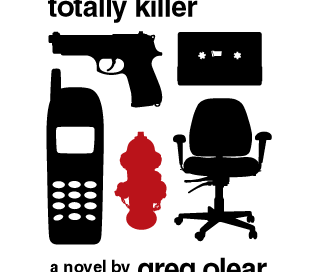Dear Reader,
Two weeks ago, I did a deep dive into Jeffrey Epstein, which led me this week into a deep dive into Robert Maxwell, the super-spy who was his alleged mentor. I appeared on a broadcast to rap about Maxwell, and during the live session, listened to Lincoln’s Bible underscore the significance of the year 1991.
She didn’t have to tell me! My first novel, Totally Killer, is set in New York City in that selfsame year. Although written over ten years ago, I went down the 1991 rabbit hole extensively while doing my research. Robert Maxwell actually appears in the book. I offer a dramatization of his murder, as well as what I trust is the literary world’s lone Robert Maxwell sex scene (!). I even mention him and Ghislaine Maxwell in the prologue!
I’m loath to showcase my own work on “Sunday Pages,” which I prefer to focus on other writers, but given all the resurgence of 1991, I hope you won’t object to me making an exception this week.
This is the second half of the prologue, in which our narrator, Todd Lander, writes in 2008 about his former roommate, Taylor Schmidt:
…
All things considered, my only regret is that I can’t write more than I’ve presented here. That I can’t spend the rest of my life studying hers, the way monastic scholars of old dedicated themselves to Christ. Would that I had the resources to author an unabridged biography—to interview acquaintances from elementary school, to spend time with her mother, to learn more about her late alcoholic father, to track down my seventy-seven fellow Taylor alumni. None of this, alas, is germane to my purpose. We’ll touch on her backstory—we’ll have to—but what concerns us here are the last days of her too-short life: the interval between the day she left her mother’s rented prefab house in Warrensburg, Missouri, for the greener pastures of New York City; to the day she returned to that same hovel, in a black plastic box, four months later.
Taylor Schmidt, dead at twenty-three.
Hers is a big story, with far-reaching ramifications, and it’s critical to cast it in the proper historical context. Everything that went down went down in New York City in the summer and fall of 1991.
Seems like only yesterday, 1991, like not that long ago, but it’s 2008 already. Babies born in 1991 have already gotten drunk, smoked pot, lost their virginity. To put it in perspective: Emma Watson, the fetching nymphet who plays Hermione in the Harry Potter franchise, was born in 1990; Jamie-Lynn Spears—already a mommy herself—in ’91; Frances Bean Cobain, Kurt’s Love child, in ‘92.
Admittedly, the Nineties are not a decade that inspires much in the way of nostalgia. But there will come a day when the significance of the first year of that apocalyptic decade will become readily apparent. The great pitch and moment of that annus mirabilis cannot be understated. As my friend Maddox once remarked, 1991 was my generation’s 1969. In those twelve fleeting months, everything fell into place: culturally, politically, socially, the whole ball of wax.
You had Operation Desert Storm, the banner headline. A Gulf War that we thought, in our prelapsarian naïveté, didn’t have the ratings to spawn a sequel.
You had Jack Kevorkian. You had Rodney King.
Jeffrey Dahmer was sentenced, Clarence Thomas confirmed, Terry Anderson released.
The web browser was introduced. The web browser.
Magic Johnson came down with HIV. Freddie Mercury died from its complications.
Robert Maxwell, the British media magnate who owned the Daily Mirror and the New York Daily News, drowned after falling from his yacht off the coast of Grand Canary Island—or so the coroner’s report stated. His own daughter suspected foul play, to say nothing of the conspiracy theorists.
Oh, and the Soviet Union—the Big Bear, our Orwellian enemy for a half a century—broke up. Just broke up, went its separate ways, like it was a fucking rock band. Like it was Mötley Crüe or Journey. And on Christmas Day, no less, capitalism’s holiest of holy days.
In 1991, my generation—the MTV Generation, the slackers, shin jin rui, Generation X—reached a creative zenith. You had the Richard Linklater film Slacker and the Douglas Coupland novel Generation X, both landmark works, released in January and May, respectively. Bret Easton Ellis published American Psycho. In September, the grunge movement arrived with Nirvana’s Nevermind. (Here we are now! Entertain us!). Three years later, Kurt Cobain would off himself—our Altamont. (Oh well, whatever, nevermind).
The aforementioned works best exemplified the “X” zeitgeist, the so-called slacker subculture, one that Baby Boom pundits misread as indifference but was really a disinclination to participate. A generation of Bartelbies the Scrivener: we preferred not to. Coupland’s anti-heroes deliberately wasting their educations tending bar in Palm Springs. From Slacker: “Withdrawing in disgust is not the same thing as apathy.” The cheerleaders from the “Smells Like Teen Spirit” video: black-clad, zoned-out, going through the motions—cheering, but not really cheering; cheering ironically. Irony, more than anything, was our hallmark. The sarcastic singing of the Sixties anthem “Everybody Get Together” on Nevermind—the intro to track #7—sums up the collective feeling at the time: We are laughing derisively at your hypocritical idealism, you Baby Boom fucks. Is it any wonder Prozac was so popular? I was on Prozac, and so was everyone I knew, Taylor included.
At the root of all our discontent was money. Understand, we were the poorest generation in memory, with little hope of financial salvation. Poverty was so inevitable, it became chic—hence the flannel shirts and dungarees and workboots. As William Strauss and Neil Howe noted in their magnificent study Generations, my cohorts and I were on course to be the most impoverished group of babies since the shat-upon Lost Generation of Fitzgerald and Hemingway. To be fair, Generations was published in 1991—that is, before the Internet exploded, and my too-smart-for-their-own-good compeers took advantage of our parents’ Luddite tendencies, thus leveling the playing field somewhat. At the time, though, who could have foreseen such a radical uptick in fortune?
The point is, 1991 was an especially bad year for money. It was a bad year to be unemployed, and a really bad year to be a wet-behind-the-ears college graduate with a sparse résumé and student loans to repay (student loans, I might add, that wouldn’t be tax deductible until the Clinton Administration). How bad was it? George Bush père enjoyed a record-high approval rating in May of 1991, at the end of the Gulf War. Eighteen months later, he lost his bid for re-election. The reason for his Cubs-in-‘69 choke, as famously explained by James Carville? “It’s the economy, stupid.”
In short, the summer of 1991 was the worst moment in a generation to be in the position Taylor Schmidt was in.
And that’s where our story begins.






As a Boomer, I will tell you we too were suffering financially, the interest rates were set at 10-12% for mortgages, if you were lucky enough to have got into the housing market in the late 1970’s early 1980’s , and just forget about car loans because the stock price for the cheapest small car was $15,000...an impossible price for most workers struggling at $10.00 an hour, even those jobs were scarce, because it was the prelude to manufacturing corporations moving to spend less on salaries and more on profit especially since many of formerly family owned businesses, became public corporations with obligations to fulfil a huge return on investment, they did this by casting about for better, cheaper labour opportunities overseas or in Mexico. The order of the day was to settle on a free trade agreement between Mexico, America and Canada (NAFTA) was in development during George HW Bush’s presidency, then Bill Clinton signed it into law. Bad news for everyone who depended on the manufacturing industry for work. Our parents, the “greatest generation”, made out like bandits with the high interest savings, and bond markets. They retired to Florida, keeping a home in their home state, as well, spending like there was no tomorrow, while we boomers were left to struggle with the maintaining the “American dream” with little to no money to pay for it all.
On the news of this past week, though, this was the time that Bill Barr had worked his fixing magic for Reagan and Bush Iran contra scandal and a few other foibles in the HW Bush presidency. No one knew just how lethal Barr would become in the 29 years since. I believe that Bush sr recommended Barr to approach Trump, to help him fix the ongoing Russian scandal that plagued him for the first 2.5 years of the Trump catastrophic presidency.
I was attending the University of Oklahoma in 91. My first memory of political rage came from listening to the dudes grilling anita hill on our college radio station while writing a paper on biodiversity. Then being infuriated by the confirmation of Thomas. Ahh memory lane. And i have a terrible memory. Thomas still sucks.